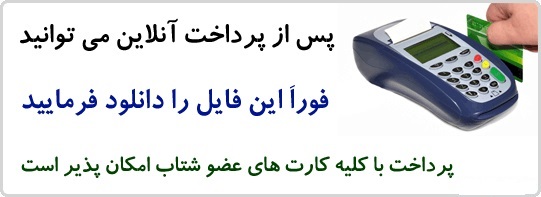
لینک دانلود و خرید پایین توضیحات
فرمت فایل word و قابل ویرایش و پرینت
تعداد صفحات: 16
11-1 مطالعه مقدماتی نظریه هوش چندگانه گاردنر، در زمینه موضوعهای درسی و سازگاری دانشآموزان
دکتر حسن پاشا شریفی(
کلید واژهها: هوش، نظریه هوش، هوش چندگانه multiple intelligence، گاردنر، موضوعهای درسی سازگاری
1 Hasan Pasha-Sharifi, Ph. D.
The Introductory Study of Gardner's Multiple Intelligence Theory, in the Field of Lesson Subjects and the Students' Compatibility
Keywords: Intelligence, Intelligence theory, multiple intelligence, Gardner, lesson subjects, compatibility
مقدمه
با افول روان شناسی رفتارگرایی و ظهور روانشناسی شناختی، به ویژه رویکرد سازندهنگرconstructivist در یادگیری، دانشآموز نه به عنوان دریافت کننده محض اطلاعات، بلکه به عنوان آفرینندة ساختارهای شناختی خویش تلقی میشود. او باید ضمن دریافت اطلاعات، آنها را پردازش کند، به تجربههای پیشین مرتبط سازد، آموختههایش را سازمان دهد و آنها را برای حل کردن مسائل واقعی زندگی و انواع مسائل پیچیده در موقعیتهای تازه به کار ببرد (پراوات و فولدن، 1994 Prawat, & Folden).
By the decline of behaviorism psychology and the appearance of cognitive psychology, especially the constructivist approach, the student is being considered not as the absolute receiver of information but rather the creator of his cognitive structures. While receiving data, he is now needed to process it, relate it to his previous experiences, organize his learnings, and use it to solve real life issues and various complex problems in new circumstances (Prawat, & Folden, 1994).
نسل آینده در دنیایی زندگی خواهد کرد که به شیوة تفکر دقیق و پیچیدهتری نیاز خواهد داشت تا با برخورداری از سیالی اندیشه و مهارتهای اساسی، خود را با شرایط همواره متحول زمان، سازگار کند.
The future generation will live in a world which will need a precise and more complex method of thinking so that it can adjust itself with the ever-changing conditions of time through fluent thought and fundamental skills.
مطالعات اخیر نشان داده است که نه تنها هوش و استعدادهای شناختی، بلکه ویژگیهای هیجانی (به ویژه هوش هیجانی) و مهارتهای اجتماعی نیز در سازماندهی فرایند یادگیری نقش اساسی دارند (کلنوسکی، 2002 Klenowski). ویژگیهایی مانند مهارت در روابط اجتماعی و درک درست احساسات دیگران و پذیرش آن، با چگونگی یادگیری پیوند تنگاتنگ دارند.
The recent studies have shown that not only intelligence and cognitive talents, but also emotional characteristics (especially emotional intelligence) and social skills have a fundamental role in organizing the learning process (Klenowski, 2002). Characteristics such as having skills for social relationships or correctly understanding others' feelings and accepting them are in tight relationship with how one learns.
برای اینکه اهداف نظام آموزشی تحقق یابد، باید اصول زیر را که برگرفته از نظریه گاردنر (2004 Gardner) است، مورد توجه قرار داد:
In order for the educational goals to be fulfilled, the following points should be considered. These points are derived from Gardner’s theory (2004):
بهخلاف دیدگاه سنتی دربارة هوش، یادگیری تنها از راه به کارگیری تواناییهای شناختی به دست نمیآید، بلکه دیگر انواع هوش نیز که در زیر مورد بحث قرار خواهد گرفت، در فرایند یادگیری نقش اساسی دارند.
افراد در فرایند یادگیری، پردازش اطلاعات و حل کردن مسئله، برحسب نوع و سطح تواناییهای هوشی خود از راهبردهای متفاوت استفاده میکنند.
برای اینکه معلم بتواند برای دانشآموزان تجارب مناسب یادگیری فراهم کند، باید استعدادهای آنان را به درستی بسنجد، سپس آنان را راهنمایی کند تا با به کاربستن حداکثر ظرفیت هوش و استعداد خود در جهت هدفهای آموزشی بکوشند.
In contrast with the traditional attitude about intelligence, learning is not gained through utilization of cognitive abilities only, but other types of intelligence, which will be discussed as follows, which also have a fundamental role in the learning process.
In the learning process the individuals use different policies to process information and problem-solve depending on the type and level of their intelligence abilities.
For the teacher to be able to provide suitable learning experiences for the students he needs to assess the students' talents correctly, then guide them to utilize the maximum capacity of their intelligence and talent in the direction of the educational goals.
دستیابی به اصول بالا مستلزم آن است که در سنجش پیشرفت و عملکرد تحصیلی دانشآموزان به جای تأکید محض بر هوش کلامی ـ زبانی و ریاضی ـ منطقی ـ که به سبب تفاوتهای فردی و گروهی دانشآموزان در الگوهای متفاوت هوش چندگانه گاردنر ناعادلانه استـ نیازها، الگوهای هوشی و راهبردهای یادگیری دانشآموزان براساس نظریه هوش چندگانه مورد توجه قرار گیرد (لزیر، 1992؛ 1991 Lazear).
Reaching the above principles requires that the assessment of the students' educational advancement and functionality to consider the students' needs, intelligence models, and policies of learning based on the theory of multiple-intelligence instead of strict emphasis on verbal-lingual and mathematical-logical intelligence – which is unfair due to the students' individual and group differences in Gardner's different models of multiple intelligence (Lazear 1991; 1992).
آزمونهای هوش سنتی بیشتر توانایی کلامی، روابط میان مفاهیم کلامی و تفکر ریاضی ـ منطقی را اندازه میگیرند و مهارتهایی مانند تجزیه و تحلیل اطلاعات جدید، حل مسائل نوین، خلاقیت و تفکر انتقادی را نمیسنجند و به گفته ویگوتسکی Vigotsky، دربارة «گستره رشد بالقوه آدمی» اطلاعات چندانی به دست نمیدهند (گاردنر، 2004).

تحقیق درباره مطالعه مقدماتی نظریه هوش چندگانه گاردنر، در زمینه موضوعهای درسی و سازگاری دانشآموزان i


